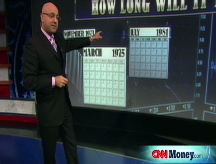Dollar rises against euro, pound, yen
The greenback is stronger against most major currencies, ahead of expected European central bank interest rate cuts.
NEW YORK (CNNMoney.com) -- The U.S. dollar gained against most major currencies Wednesday, ahead of expected interest rate cuts by European central banks this week and amid volatile global equity markets.
The 15-nation euro traded at $1.2705, down from $1.2714 late Tuesday. The British pound slid to $1.4772 from $1.4919.
Meanwhile, the greenback was slightly higher against the Japanese yen. The dollar bought ¥93.31, up from ¥93.18 late Tuesday. Still, the U.S. currency has lost more than 10% against the yen since the failure of Lehman Brothers in mid-September.
The Japanese yen has a very low interest rate and is typically used in "carry trades." In a carry trade, the investor sells one currency with a low interest rate and buys an investment in a currency with a higher interest rate with the goal of making a profit. As investors reverse the carry trade, and there is less selling of the yen, it gains in value.
European rate cuts: The European Central Bank and the Bank of England are both expected to announce interest rate cuts later this week. While the Federal Reserve has been aggressively cutting its interest rates, the European central banks have been lagging behind.
"Markets are pretty much expecting cuts from both central banks, but the question is who is going to cut more," said Sacha Tihanyi, currency strategist for Scotia Capital.
Tihanyi added that the market is expecting the Bank of England to be the more aggressive of the two.
Global equity markets: The dollar has climbed against other major currencies as investors retreat from the volatility of global equity markets and look to park their funds in safe havens.
Government debt backed by the U.S. government is perceived to be one of the safest places for investors to keep their assets, especially in times of economic uncertainty. In order to purchase government debt, investors have to buy dollars.
Furthermore, weakness in global equity markets "is weighing on other currencies and providing some support to the U.S. dollar, despite the continuing bad economic data coming out of the U.S.," said Tihanyi.
The National Bureau of Economic Research officially announced Monday that the U.S. economy fell into a recession in December 2007.
And on Wednesday, the Institute for Supply Management's (ISM) non-manufacturing index fell to 37.3 in November, from 44.4 in October. The November reading was the lowest level since the purchasing manager's group began tracking the index in 1997.
"The economic situation in the U.S. is very bad but it is very bad everywhere," said Tihanyi. While negative U.S. economic data would normally take precedence, the currency market has shifted its focus and reaction to the global equity markets. ![]()




